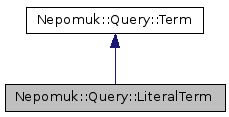Nepomuk
#include <Nepomuk/Query/LiteralTerm>

Additional Inherited Members | |
 Public Types inherited from Nepomuk::Query::Term Public Types inherited from Nepomuk::Query::Term | |
| enum | Type { Invalid, Literal, Resource, And, Or, Comparison, ResourceType, Negation, Optional } |
 Static Public Member Functions inherited from Nepomuk::Query::Term Static Public Member Functions inherited from Nepomuk::Query::Term | |
| static Term | fromString (const QString &s) |
| static Term | fromVariant (const Variant &variant) |
 Related Functions inherited from Nepomuk::Query::Term Related Functions inherited from Nepomuk::Query::Term | |
| static Term | fromProperty (const Types::Property &property, const Variant &variant) |
Detailed Description
Match literal properties via full text.
Other than the rest of the terms LiteralTerm has two uses:
Usage in ComparisonTerm
LiteralTerm can be used in a ComparisonTerm with both properties with a literal range and a resource range. The former case is the simple one: the value() of the LiteralTerm will simply be compared to the value of the ComparisonTerm::property(). In the latter case value() will be matched to rdfs:label of any resource. So in essence the following two examples are equal:
Usage as "stand-alone" term
As a term by itself LiteralTerm will act like a traditional full text query and match all resources that contain the string value in some property.
The example above will match all resources that have a property with a value containing the string "nepomuk".
Examples
LiteralTerm("nepomuk")
searches for the term "nepomuk".
LiteralTerm("'nepomuk*'")
searches for the terms starting with "nepomuk".
LiteralTerm("'nepomuk kde'")
searches for the term "nepomuk kde".
LiteralTerm("'nepomuk* kde'")
searches for terms matching "nepomuk* kde".
LiteralTerm always tries to normalize the query terms as best as possible. This includes automatically adding quotes as needed.
- Warning
- Be aware that the examples above apply to using LiteralTerm as a stand-alone term or in a ComparisonTerm::Contains term. When using ComparisonTerm::Regexp the test as specified will be used as-is to create the regular expression.
- Since
- 4.4
Definition at line 86 of file literalterm.h.
Constructor & Destructor Documentation
| Nepomuk::Query::LiteralTerm::LiteralTerm | ( | const LiteralTerm & | term | ) |
Copy constructor.
| Nepomuk::Query::LiteralTerm::LiteralTerm | ( | const Soprano::LiteralValue & | value = Soprano::LiteralValue() | ) |
Default constructor.
- Parameters
-
value The value this LiteralTerm should match to.
| Nepomuk::Query::LiteralTerm::~LiteralTerm | ( | ) |
Desctructor.
Member Function Documentation
| LiteralTerm& Nepomuk::Query::LiteralTerm::operator= | ( | const LiteralTerm & | term | ) |
Assignment operator.
| void Nepomuk::Query::LiteralTerm::setValue | ( | const Soprano::LiteralValue & | value | ) |
Set the value this LiteralTerm should match to.
- See also
- value()
| Soprano::LiteralValue Nepomuk::Query::LiteralTerm::value | ( | ) | const |
The value this LiteralTerm should match to.
- See also
- setValue()
The documentation for this class was generated from the following file:
Documentation copyright © 1996-2014 The KDE developers.
Generated on Tue Oct 14 2014 22:48:27 by doxygen 1.8.7 written by Dimitri van Heesch, © 1997-2006
KDE's Doxygen guidelines are available online.
 KDE API Reference
KDE API Reference